A Genealogy Murder Mystery That Makes You Feel Like Sherlock with Dial‑Up
Rating: 9.3/10 – A deductive virtuoso’s dream
Setting the Scene
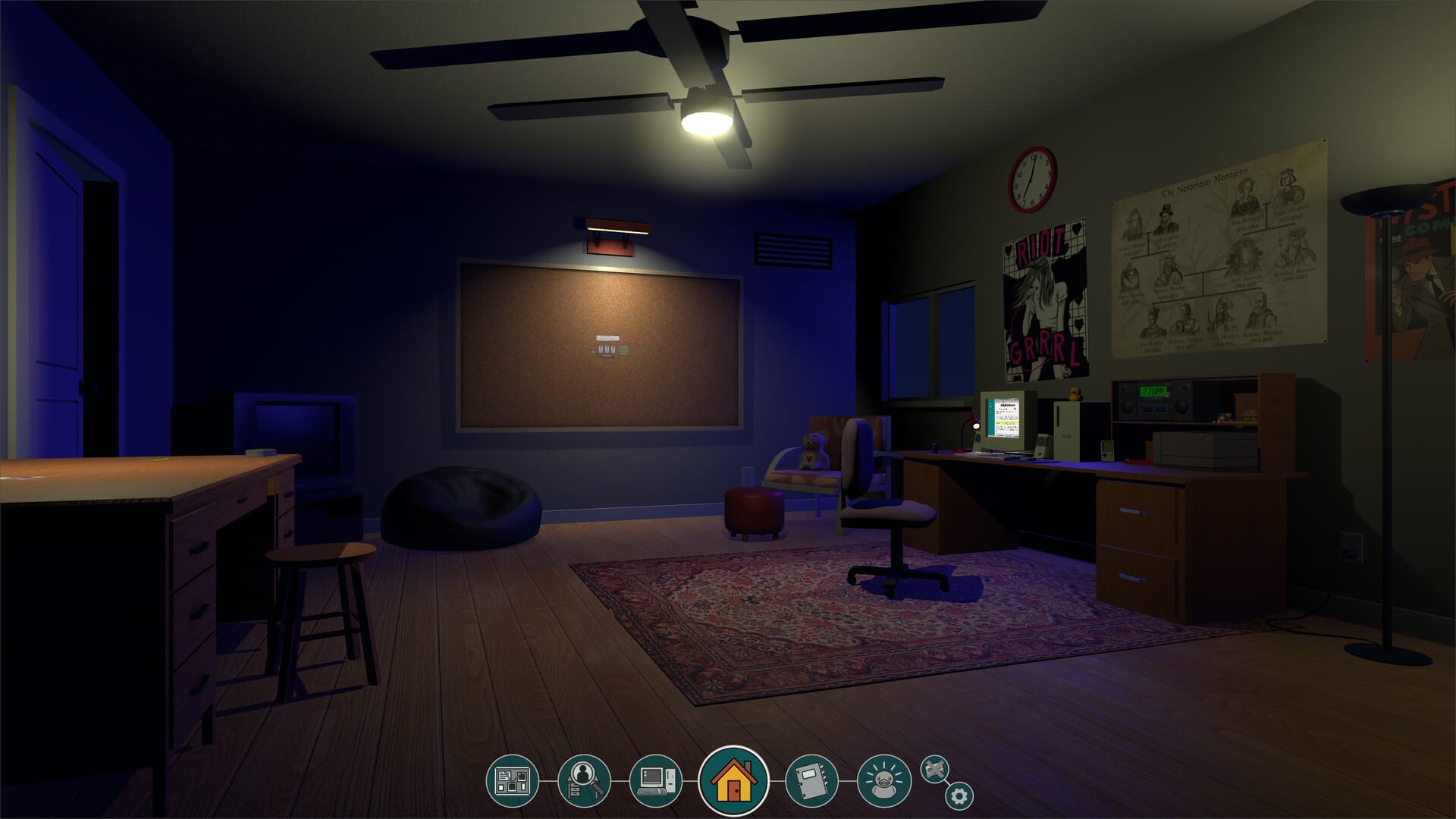
Imagine it’s 1998. You’re holed up in a softly lit apartment, 56 kbps dial‑up buzzing away. A knock at the door—three Roottree sisters and their parents have just died in a plane crash. Why does that matter? Because they owned a candy empire worth hundreds of millions, and only true blood‑kin get a slice. Your job: untangle the twisted branches of that gigantic Roottree family tree—and figure out who’s really related.
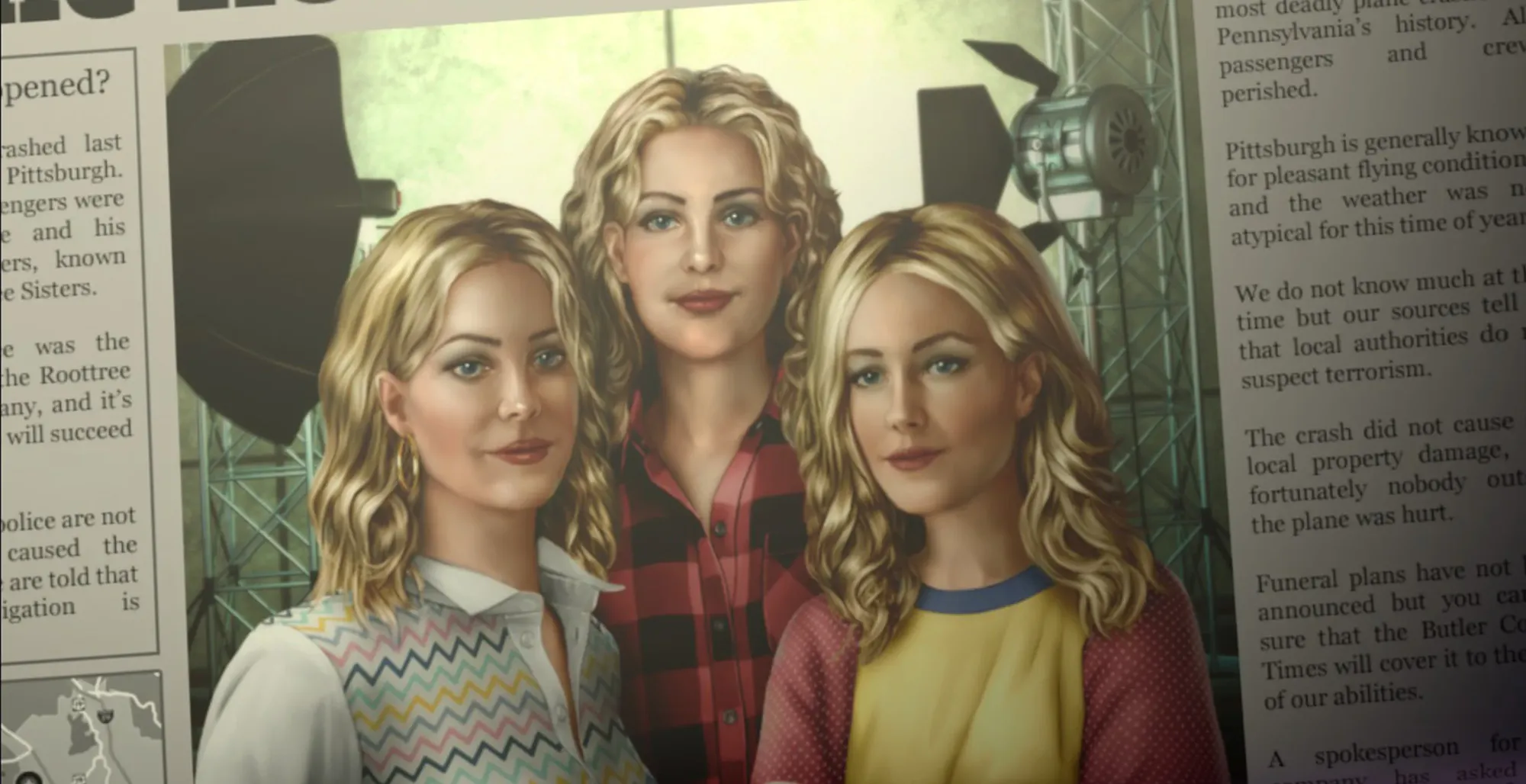
That’s The Roottrees Are Dead. Originally a browser game jam entry in 2023 by Jeremy Johnston, the free version used AI art and spread like wildfire among indie puzzle fans. But for Steam it got a full remaster in January 2025, helmed by Robin Ward, with hand‑drawn visuals from Henning Ludvigsen and new polish throughout.
Gameplay: The Perfect Slow‑Cook Detective Sim

At the heart of Roottrees is a simple but engrossing loop:
- Presented with a photo or partial data about a Roottree claimant,
- You “SpiderSearch” names, events, magazines, jobs, charities—data sprinkling leads,
- You drag and place the correct person into your virtual corkboard family tree,
- Each lock‑in narrows down possible matches—until the net tightens and you roar ahead.
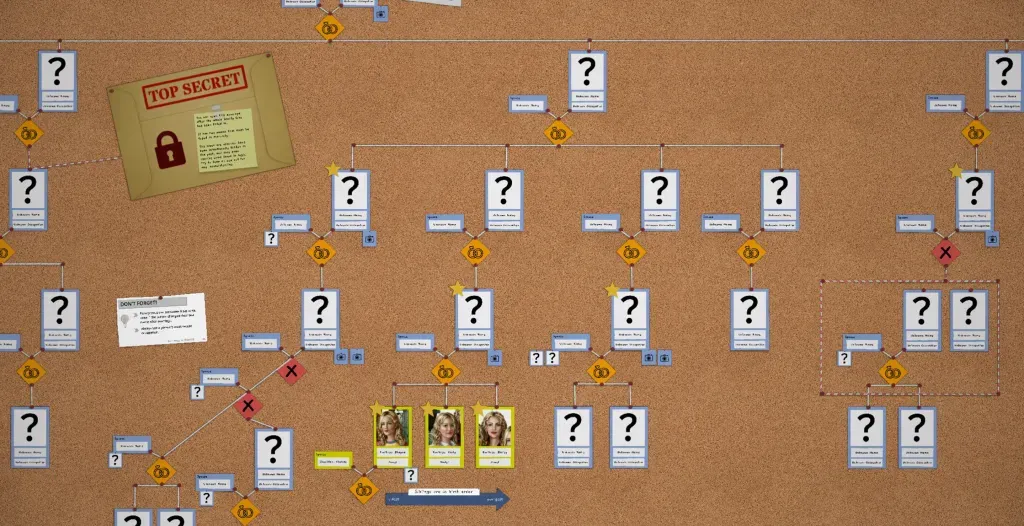
The interface is old‑school: a CRT monitor, retro web browser, a cork‑pinboard and some sticky notes.
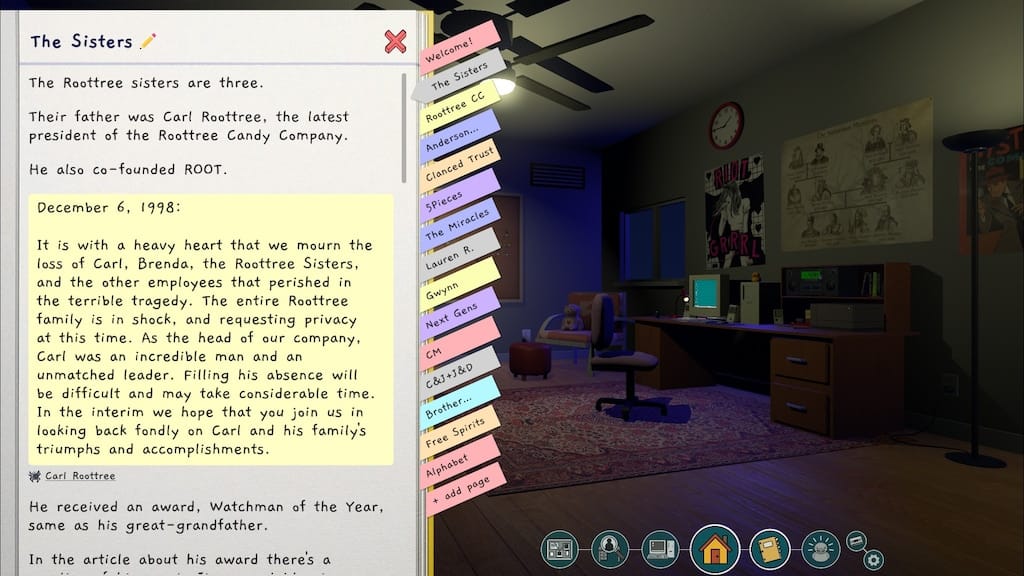
And yet slickly modern—highlight text, copy and search within notes, built‑in hints, optional tangential entries—easily one of the most refined investigative UIs in recent memory.
Critics often compare it to Return of the Obra Dinn and Her Story, and with good reason. Both inspired its design ethos: detective work instead of dodging bullets. Roottrees wears its inspirations on its sleeve—but it also stands apart with its genealogical twist and modern interface flair.
Why it stands out

1. Real deduction, not rote puzzle-solving
Dead‑end searches are purposeful: the system sometimes flat‑out tells you “this isn’t helpful”—and occasionally in comedic ways. That curbs aimless contact with the UI and makes success feel earned.
2. Hint system done right
When truly stuck, hints nudge with keywords or documents instead of outright answers. Perfect if you’re the kind of player who wants a little rescue without your triumph spoiled.
3. Mechanics that teach you how to play
Rather than rigid tutorial boxes, the game folds guidance into the investigative tools. Misspell “Silver screen magazene”? The browser gently suggests the correct “SilverScreen Magazine” after a search fail—an elegant mini‑lesson in deduction itself.
4. Optional extras for deep divers
Once you've finished the main tree, the optional Roottreemania mode opens in January 1999 and extends the mystery: now claimants appear based on messy, hidden affairs and lawsuits. It practically doubles playtime and punches up the intrigue.
Altogether this is a detective puzzle that respects your intuition and intelligence. It's not a gauntlet—it’s a gentle but satisfying mental marathon, ideal for fans of cerebral, nibble‑your‑coffee‑cup games.
Narrative & Thematic Flourish
Yes, there’s a tragedy at the outset. But thankfully, Roottrees isn’t a grim conspiracy thriller. Instead, the plot unfolds as a juicy 90s soap opera: crooked marriages, lawsuits, illegitimate heirs, corporate sabotage, secret siblings, and a founder who explicitly outlawed certain relatives in his will.
It unfolds with tonal levity more than darkness, reminiscent of a Succession‑style tabloid narrative: rich, greedy, suspicious—but never bleak. There’s no global conspiracy, just family hypocrisy in droves. And that makes the unraveling feel sweeter, voyeuristic, and—dare I say—morally safe.
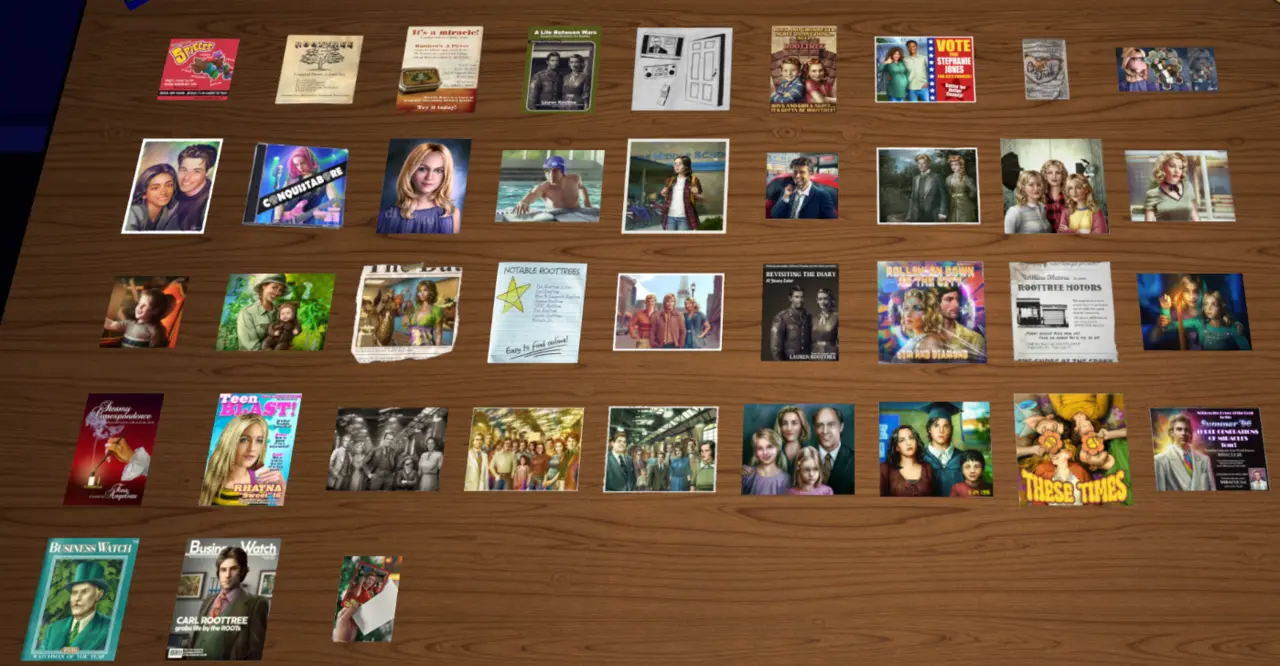
At the end, the mysterious client reveals her identity: Samantha Madsen, an illegitimate Roottree descendant, bent on writing a family history exposé. She wants to prove her bloodline—and inheritance rights—for her daughter and granddaughters. The weight of generational exclusion lets the story resonate deeper than “find the siblings” puzzle soup.
Roottreemania adds fire to the cake. Eight months later, corporate heir Clark Rafferty confesses new claimants are emerging—claimants tangled in the familial shadow economy. Now you're chasing second‑ and third‑rate heirs, scandals previously locked in trunk. It's rich, layered, and slyly subversive.
Visuals & Audio: Nostalgia, Not Novelty
Visually, Roottrees goes for minimalist authenticity rather than flash. The main vistas are the CRT, corkboard, retro PC UI—and it works. Steam replaced the original mid‑journey AI art (which drew mixed reactions) with roughly 40 new illustrations by Henning Ludvigsen, giving each photo and article clean polish and consistency across the board.

That switch from shaky, warped AI faces to deliberate, human‑made art gives the game a tangible coherence and clarity—essential when small visual details (like a ring or hairstyle) matter for deductions.
The ambient jazz soundtrack, keyboard clacks, and printer sounds create cozy detective ambiance. Voice‑acting appears in certain cutscenes or radio/TV background clips—a pleasant treat, not overused fluff. It's nodding to noir without ever making you reach for a trench coat or fedora.
What Works… and What Trips You Up
The highlights:
- Brilliant UI design: easily make notes, highlight text, hop between search, evidence, and the tree.
- Hint system: strategically supportive, never spoon‑feeding.
- Roottreemania sequel mode: adds depth beyond the main plot.
- Deduction‑driven gameplay: gratifying logic puzzles that reward attention.
- Narrative depth: appreciates familial drama, legacy abuse, and personal secrets over sensational horror.
- Accessible unusual genre: ideal for fans of investigative games who prefer brains over reflexes.
The drawbacks:
- Possible directionless moments: you can spin your wheels if you don’t use hints or go down red herrings too long.
- Later clues hinge on narrow evidence: the second half can sometimes rely heavily on one crucial document—which can feel contrived if you miss it early on.
- Fewer emotional peaks: it's mostly cerebral, with only mild emotional payoff. If you're craving overt drama, there’s not much catharsis.
- Six‑hour runtime: the main game is short (6 hours), and even including Roottreemania only totals ~12 hours. Great for binge‑play, but fleeting.
Final Verdict: Worth Every Penny
At a Steam price of around $20, The Roottrees Are Dead punches way above its weight. Steam users total nearly 3,000 reviews with a 97% “Overwhelmingly Positive” rating—and critics agree it’s a remarkable entry in the emerging “deduction game” genre. Metacritic calls it “generally favorable.” PC Gamer UK cited it as “riveting,” Game Informer praised its nostalgic ambience, and multiple voices called it “one of the most fun detective games since Obra Dinn."
If you enjoy games that make you feel brilliant, enjoy furniture‑free detective puzzlers, and don't mind wrestling with gray text and inference leaps, this is the game for you. It's refined, rewarding, and just odd enough to feel new again.
Consider it a love letter to the joys of sleuthing across newspaper archives, twisting family legends, and unmasking wealthy relatives. Roottrees is the rare puzzle game that doesn’t insult your brain, rewards your patience, and generously lets you feel cunning when you connect the dots.
Play it now, and if you've got a few hours, don’t forget to dive into Roottreemania. It might just be the best detective double‑feature of the year.
TL;DR
| Feature | Verdict |
|---|---|
| Gameplay & UX | Elegant detective mechanics, intuitive note tools, satisfying deduction |
| Narrative | Subtle drama, ironic legacy critique, personable reveals |
| Visuals & Audio | 90s retro UI with human art overhaul, cozy jazz ambience |
| Extra content | Roottreemania adds new cases and continues the story |
| Length | ~6 hours main, ~12 total with sequel mode |
| Price/Value | ~$20, exceptionally high value for content and polish |
| Best for… | Fans of Obra Dinn, Her Story, cerebral games, genealogy buffs |
In short: The Roottrees Are Dead is as sly, satisfying, and smart as a candy‑bar empire’s family tree is twisted. With its hand‑drawn artwork, cheeky 90s browser UI, and layered detective gameplay, it's essential playing for anyone who loves being the quiet genius in the room.
Grab your virtual corkboard, fire up SpiderSearch, and prepare to file away family secrets one clue at a time.






